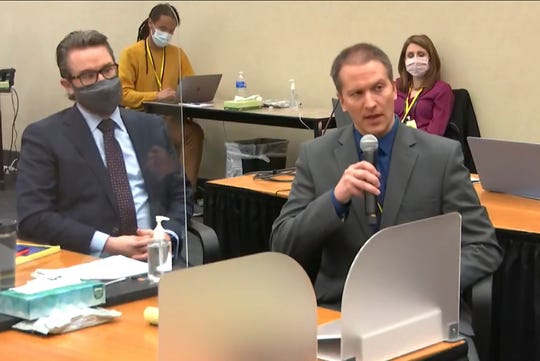Derek Chauvin was convicted, but the public still hasn’t won

Former police officer Derek Chauvin was convicted Tuesday of murdering George Floyd, a Black man, by kneeling on his neck for 9 minutes and 29 seconds until he was limp and lifeless.
Chauvin lost his claim of innocence. But who actually won?
Certainly in the most basic terms there was justice for the victim and his profoundly aggrieved family. The man who murdered Floyd will be punished.
The system ‘worked’?
And some might argue that the legal system finally “worked” for those terrible moments when a police officer abuses power and kills someone, too often someone of color.
But what does it really mean — that the system worked?
Is there a new Chauvin standard that offers solace to Black parents who daily are terrified their child could be pulled over for a minor traffic violation that suddenly, inexplicably escalates into the killing of their loved one?
Former Minneapolis police Officer Derek Chauvin addresses the judge on April 15, 2021. (Photo: Court TV via AP)
Are we to assure them not to worry, that Chauvin’s conviction will act as a brake on violent police misconduct.
All that’s required is that senior officials in the department, including the chief, come forward to testify that what the abusive officers did was “in no way, shape, or form is anything that is by policy, it is not part of our training, and it is certainly not part of our ethics or our values.” (Which was Minneapolis Police Chief Medaria Arradondo’s testimony of Chauvin, echoed by Chauvin’s former supervisor, the senior homicide investigator and a department training expert.)
Oh, and deterrence would also require that every potentially illicit action by the arresting officers be captured from all angles on police body cameras, onlooker iPhones and nearby surveillance systems; and that the footage be pieced together so that a phalanx of heart and lung experts might discern for a jury the minute the victim’s brain suffered irreparable damage or the second a last breath was taken.
Clues from the trial
The truth is that it took a mountain of prosecution evidence to convict one brutal cop of murdering a Black man during the simple act of arresting him for allegedly using a $20 counterfeit bill to buy cigarettes.
Will Chauvin’s conviction actually deter others like him, or cause brethren officers to step forward and report misconduct?
There are clues from the trial. Chief among them the video image of Chauvin.
Even as Floyd begged for air before going silent and slack, even as bystanders pleaded for his life, even as Chauvin could see them recording everything on their iPhones, even as another officer suggested rolling Floyd over (“No, he’s staying put where we got him,” Chauvin replied); and even as paramedics arrived and felt no pulse, Chauvin kept his knee planted where it was.
Imagine the sense of confidence and unaccountable freedom it took for Chauvin — at the center of all that attention — to sustain a life-robbing chokehold for nearly 10 minutes without displaying a flicker of doubt or hesitation.
He was no rookie. Chauvin had 19 years with the department, had been the subject of 18 misconduct complaints and involved in several shootings. He had persevered and was even tapped to be a field training officer for new recruits.
‘You’re going to kill me, man’
His ways were the right ways, and who would question him? Certainly not George Floyd.
“You’re going to kill me, man,” Floyd pleaded before losing consciousness.
“Then stop talking, stop yelling. It takes a heck of a lot of oxygen to talk,” an unmoved Chauvin answered.
Police agencies across the country can take sensible steps to try to curb police killings of Black males. They can mandate body cameras, ban chokeholds and require independent reviews when a killing results. They can insist police officers refrain from carrying Tasers and handguns on the same side of their body, so they don’t accidentally shoot someone they intend to stun, as happened April 11 near Minneapolis in the death during a traffic stop of Daunte Wright, 20. And states can even enact broad police accountability measures as Maryland legislators did this month.
But as the Christopher Commission that investigated the 1991 police beating of Rodney King noted in its findings: “Officers are given special powers, unique in our society, to use force, even deadly force. … Along with that power, however, must come the responsibility of loyalty first to the public the officers serve. That requires that the code of silence not be used as a shield to hide misconduct.”
Until it is instilled in police that their first loyalty is to the George Floyds of the world, there will be no winners for the conviction of Derek Chauvin.
USA TODAY’s editorial opinions are decided by its Editorial Board, separate from the news staff and the USA TODAY Network. Most editorials are coupled with an Opposing View, a unique USA TODAY feature.
To read more editorials, go to the Opinion front page or sign up for the daily Opinion email newsletter. To respond to this editorial, submit a comment to [email protected].
Source: Read Full Article

